Suchergebnisse für "Factsheet: Energietechnologien gestalten, die für alle sinnvoll und nutzbar sind"
Systemic renovation in the social housingsector

This project treats a global renovation of a residential estate built in the 1960s in the context of council housing in a laggard region. The point is to optimise with a systemic approach in a interdisciplinary team all partitions which include habitation.
Information-point for renewable and environmental/ecological materials

An internet platform with full information and detailed data about building materials made of renewable resources, which serves as the central information-point for different stake holders - from private house builders over architects and master-builders to experts in the field of building laws and regulations.
Innovation meets tradition
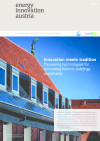
Pioneering technologies for renovating historic buildings sustainably
energy innovation austria
1/2014
Herausgeber: BMVIT und Klima- und Energiefonds
Englisch, 8 Seiten
Downloads zur Publikation
Practice Guide for Sustainable Building Sanitation and Modernisation within Construction Intents

A checklist considering priority, construction progress and actors is elaborated to serve a future-oriented selection of materials, energy carriers, design and construction within building sanitation, under a deliberate consideration of the involved actors from the construction branch
Intelligent and green? User centred scenarios for information technology use in sustainable buildings

The project asked for the contribution of information technology use to the environmental performance of buildings - in terms of the vision of designers, practical use in existing projects and expectations of potential users.
Development of modular parts for clay-passive houses

Development of extensive storey-high modular parts made of renewable primary products (wood, straw, hemp) for clay-passive houses.
Building innovations from Austria
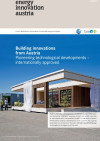
Pioneering technological developments – internationally approved
energy innovation austria
1/2017
Herausgeber: BMVIT und Klima- und Energiefonds
Englisch, 8 Seiten
Downloads zur Publikation
Solar Adsorption cooling system of residential and office buildings (SunSorber)

In the on hand project an adsorber/desorber for a solar operated/district heating operated one-level adsorption chiller with water as cooling agent and silica gel as adsorbent agent will be planned for a low range of performance (2 to 50 kW refrigerating capacity). It will be implemented as a test-/pilot plant. Hence these two substances are an alternative to the HFCKW´s cooling agents that are used nowadays.
Acceptance and improvement of low-energy-house components as a mutual learning process for users and producers

A social scientific investigation of acceptance and dissemination strategies for controlled ventilation systems with waste heat recovery and a joint heating system in low energy and passive houses.
University Plus-Energy Office High-Rise Building
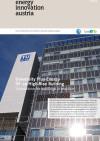
Innovations for buildings in practice
Herausgeber: BMVIT und Klima- und Energiefonds
Englisch, 8 Seiten
Downloads zur Publikation
Cities as innovation drivers
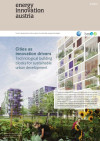
Technological building blocks for sustainable urban development
energy innovation austria
4/2013
Herausgeber: BMVIT, Klima- und Energiefonds
Englisch, 8 Seiten
Downloads zur Publikation
Building innovations from Austria in the Arab world
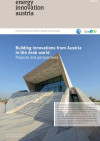
Projects and perspectives
energy innovation austria
3/2014
Herausgeber: BMVIT and Klima- und Energiefonds
Englisch, 8 Seiten
Downloads zur Publikation
Active Buildings
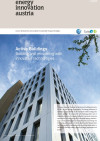
Building and renovating with innovative technologies
energy innovation austria
1/2013
Herausgeber: BMVIT & Klima- und Energiefonds
Englisch, 8 Seiten
Downloads zur Publikation
New Standards for Old Houses. Sustainable Renovation Concepts for Houses on Estates Built Between the Wars and Post-War

The many housing estates of detached houses in Austria built in the times of economic crisis between the wars and post-war as part of publicly funded housing programmes are the starting point for this research project. The aim is to offer detailed guidelines with basic planning principles for the renovation of these housing estates with detached houses, aiming to reach the standard of a low-energy house or a passive house.
Innovative moth-protection system for sheepwool insulation

This project developed a novel "bio-pesticide"-formula by screening plant extracts and minerals for their strong repellant activity in order to protect sheepwool insulation from cloth moth infestation. It was investigated and examined by state-of-the-art-technology that the anti-moth-mixture extracted from plants and minerals, acts as a valid alternative to existing pest control agents.
Contracting as a instrument for renovation

Development of contracting models for comprehensive renovation service packages.
IEA SHC, Task Solar Thermal Plants with Advance Thermal Storage Technologies for Low Energy Buildings

Participation in TASK 32 "Storage concepts for solar buildings". Subtask leader of the subtask for heat storage based on phase change materials
CIT City in Transition - A Model for Comprehensive Renewal Processes to Increase the Value of Urban Areas

By means of pilot projects in two urban areas comprehensive goals and criteria, assessment approaches and a code of practice for sustainable urban renewal are elaborated jointly with decision makers and experts in urban development.
Solar cooling machine with a cooling power of 2 kW

Development and building of a prototype of a coolingmachine with a cooling power of 2 kW, tests and optimizing on a test facility, connection to a solar unit and utilization for air conditioning.
Schiestlhaus, Hochschwab

An integrated (overall) concept for an ecological alpine refuge hut based on solar energy
